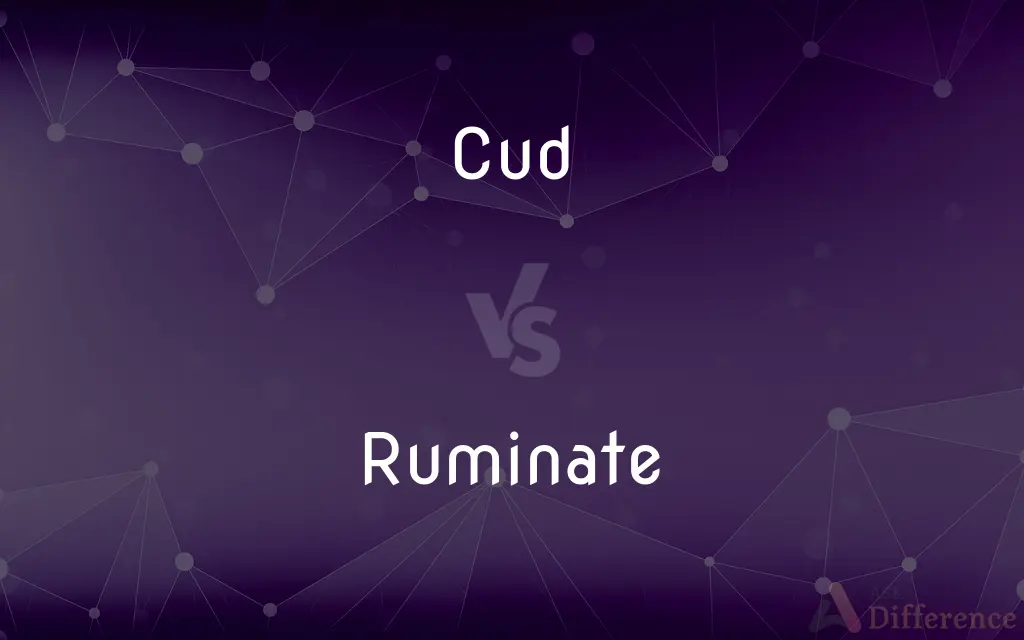Cud vs. Ruminate — What's the Difference?
By Tayyaba Rehman & Maham Liaqat — Updated on April 9, 2024
Cud is partially digested food returned from the first stomach of ruminants to the mouth for further chewing, whereas ruminate involves both the physical process of chewing cud and the mental act of deep thinking.

Difference Between Cud and Ruminate
Table of Contents
ADVERTISEMENT
Key Differences
Cud refers to the regurgitated semi-digested food that ruminant animals like cows and sheep chew again to aid digestion. This process is crucial for breaking down plant-based foods into nutrients they can absorb. On the other hand, ruminate has a dual meaning; it not only describes the physical act of chewing cud but also metaphorically refers to the act of deep, reflective thinking or pondering over something for an extended period.
While cud is a tangible substance, specifically a part of the digestive process in certain mammals, ruminate extends beyond the physical into the realm of thought and reflection. Whereas cud chewing is an observable behavior in animals, ruminating in the context of human thought is an internal process, often invisible to the outside observer.
Cud chewing is a repetitive and necessary part of a ruminant's feeding routine, optimizing the breakdown and absorption of nutrients from tough plant matter. In contrast, rumination in humans can be both constructive, as in thorough problem-solving, and detrimental, as in obsessive overthinking.
The term 'cud' is strictly used in the context of animal digestion and has no application outside this biological process. However, 'ruminate' bridges the gap between the animal kingdom and human psychology, illustrating the versatility and depth of the English language in describing both concrete and abstract processes.
Cud's role is primarily nutritional, aiding in the efficient digestion of cellulose-rich vegetation through microbial fermentation in the rumen. Ruminate, when used to describe human thought, implies a process that can lead to either clarity and insight or unnecessary stress and anxiety, depending on the context and manner of the rumination.
ADVERTISEMENT
Comparison Chart
Definition
Partially digested food in ruminants
Chewing cud or deep thought
Context
Zoological
Both zoological and psychological
Process
Physical
Physical and mental
Purpose
Nutrient breakdown and absorption
Digestion or reflection
Visibility
Observable behavior
Both observable and internal
Compare with Definitions
Cud
A bolus of food brought back into the mouth by ruminating animals.
Watching the goats chew their cud can be oddly calming.
Ruminate
To chew the cud, as a ruminant.
The giraffe ruminated quietly in the savannah.
Cud
The material in the rumen that returns to the mouth for additional processing.
The vet explained how cud is essential for nutrient extraction in cows.
Ruminate
To meditate or ponder on a subject.
He ruminated on the poem's meaning into the late hours.
Cud
Partially digested food regurgitated by ruminants for further chewing.
The cow chewed its cud peacefully under the tree.
Ruminate
To think deeply about something.
She ruminated over the decision for weeks.
Cud
A step in the complex digestive system of certain herbivores.
Cud chewing is vital for breaking down cellulose in their diet.
Ruminate
The process of bringing up cud to be chewed again.
Ruminating aids in the digestion of fibrous plant material.
Cud
Chewed plant material in the process of ruminant digestion.
The sheep spent the afternoon lazily chewing cud.
Ruminate
Reflecting deeply on a topic.
They ruminated on future plans during the long drive.
Cud
Cud is a portion of food that returns from a ruminant's stomach to the mouth to be chewed for the second time. More accurately, it is a bolus of semi-degraded food regurgitated from the reticulorumen of a ruminant.
Ruminate
To turn a matter over and over in the mind.
Cud
Food regurgitated from the first stomach to the mouth of a ruminant and chewed again.
Ruminate
To chew cud.
Cud
Something held in the mouth and chewed, such as a plug of tobacco.
Ruminate
To reflect on over and over again.
Cud
The portion of food which is brought back into the mouth by ruminating animals from their first stomach, to be chewed a second time.
Ruminate
(intransitive) To chew cud. (Said of ruminants.) Involves regurgitating partially digested food from the rumen.
A camel will ruminate just as a cow will.
Cud
(transitive) To bring back into the mouth and chew a second time.
Ruminate
(intransitive) To meditate or reflect.
I didn't answer right away because I needed to ruminate first.
Cud
Alternative form of could
Ruminate
(transitive) To meditate or ponder over; to muse on.
Cud
That portion of food which is brought up into the mouth by ruminating animals from their first stomach, to be chewed a second time.
Whatsoever parteth the hoof, and is cloven-footed, and cheweth the cud, among the beasts, that shall ye eat.
Ruminate
(botany) Having a hard albumen penetrated by irregular channels filled with softer matter, as the nutmeg and the seeds of the North American papaw.
A ruminate endosperm
Cud
A portion of tobacco held in the mouth and chewed; a quid.
Ruminate
To chew the cud; to chew again what has been slightly chewed and swallowed.
Cud
The first stomach of ruminating beasts.
Chewed the thrice turned cud of wrath.
Ruminate
To think again and again; to muse; to meditate; to ponder; to reflect.
Apart from the hope of the gospel, who is there that ruminates on the felicity of heaven?
Cud
Food of a ruminant regurgitated to be chewed again
Ruminate
To chew over again.
Cud
A wad of something chewable as tobacco
Ruminate
To meditate or ponder over; to muse on.
Mad with desire, she ruminates her sin.
What I knowIs ruminated, plotted, and set down.
Ruminate
Having a hard albumen penetrated by irregular channels filled with softer matter, as the nutmeg and the seeds of the North American papaw.
Ruminate
Chew the cuds;
Cows ruminate
Ruminate
Reflect deeply on a subject;
I mulled over the events of the afternoon
Philosophers have speculated on the question of God for thousands of years
The scientist must stop to observe and start to excogitate
Common Curiosities
What does it mean to ruminate?
To ruminate means to chew cud or to think deeply about something.
What is cud?
Cud is partially digested food that ruminants regurgitate to chew again.
What types of animals chew cud?
Ruminants like cows, sheep, goats, and deer chew cud.
Is rumination a voluntary process in animals?
Yes, animals voluntarily bring up cud to chew it again as part of their digestion process.
How does rumination affect humans?
Rumination in humans can lead to deeper understanding or cause stress and anxiety if it turns into overthinking.
What's the difference between cud and other food?
Cud is specifically semi-digested food that is regurgitated for further chewing, unlike other food which is digested normally.
Can only animals ruminate?
No, ruminate can refer to both the physical act of chewing cud in animals and the mental act of deep thinking in humans.
Is cud chewing essential for ruminants?
Yes, cud chewing is essential for the digestion and nutrient absorption of ruminants.
How long do animals chew their cud?
The time spent chewing cud varies among species and individual animals but can be several hours a day.
How does cud chewing aid in digestion?
Cud chewing physically breaks down food further and stimulates saliva production, aiding in the digestion process.
What can be done to reduce harmful rumination in humans?
Techniques like mindfulness, focusing on solutions rather than problems, and seeking external perspectives can help reduce harmful rumination.
Can rumination be harmful?
While physical rumination is beneficial for animals, mental rumination can be harmful for humans if it leads to excessive worry or stress.
Why do humans ruminate mentally?
Humans ruminate mentally to process emotions, solve problems, or make decisions, though it can become unproductive if excessive.
Is there a limit to how much one should ruminate?
In humans, excessive rumination can be counterproductive, so it's advisable to find a balance.
Do all ruminants chew cud in the same way?
While the basic process is similar, there may be variations in how different species of ruminants chew their cud.
Share Your Discovery

Previous Comparison
Ethics vs. Scruples
Next Comparison
Acrobatics vs. AthleticsAuthor Spotlight
Written by
Tayyaba RehmanTayyaba Rehman is a distinguished writer, currently serving as a primary contributor to askdifference.com. As a researcher in semantics and etymology, Tayyaba's passion for the complexity of languages and their distinctions has found a perfect home on the platform. Tayyaba delves into the intricacies of language, distinguishing between commonly confused words and phrases, thereby providing clarity for readers worldwide.
Co-written by
Maham Liaqat















































